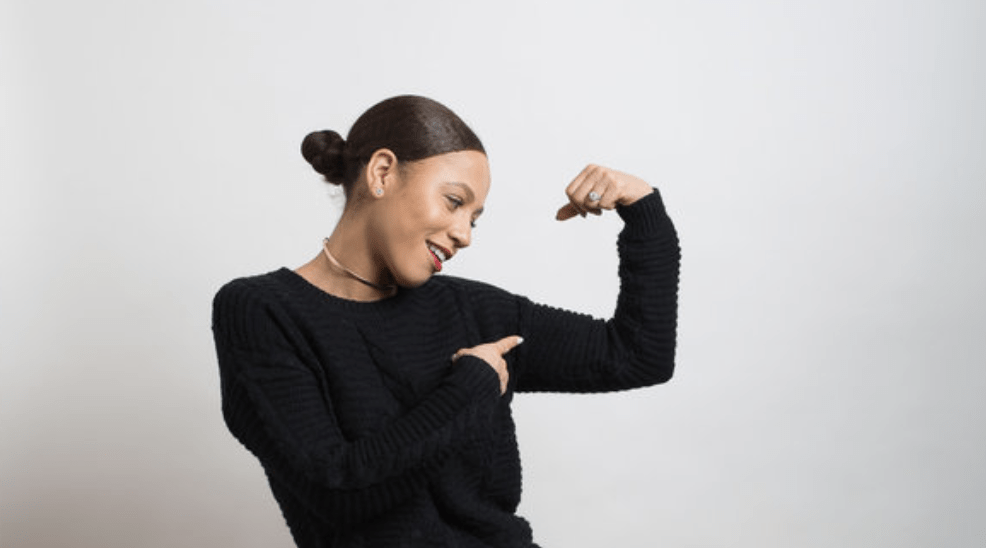Dr. Mareena Robinson Snowden is the first black woman to receive a doctorate in nuclear science and engineering from the Massachusetts Institute of Technology.
With her research focused on the detection of passive warhead signatures, Mareena is trained to operate, read and calibrate the radiation devices that clue us in on the presence or absence of nuclear warheads. This black woman is an actual, real-life superhero who has the knowledge and the power to help save the world.
Since completing her program in 2017, the Miami native and Florida Agricultural and Mechanical University alumna has become a symbol of Black Excellence, the epitome of Black Girl Magic and the latest in an elite class of black firsts.
Photo: Essence Magazine
But it wasn't until Mareena was well into her stint at MIT that she said she even realized the gravity of her stake as the first black woman to break this particular glass ceiling. "I only figured it out because I was looking for a mentor to connect with, somebody to figure out what my next steps would look like," Mareena told Blavity. "Speaking to the administration in my department, they let me know, 'our records don’t show anybody, so it looks like you’re going to be the first.'" 
Mareena extols the truisms of discipline and hard work as major keys to her success. "I was never the one to crack the book and get it on the first try. That has never been my track record. My track record has been one of a lot of examples, a lot of failure and a lot of trying again," she shared. "After a while, it sinks in. You start to make connections between different problems that you’re doing and different methods of solving problems. But, in order to crack that code, you have to keep at it. That’s where the discipline comes in."

Mareena recently sat down with Blavity to discuss her role as an African American first, how she has overcome perceived barriers and the impact of her village in cementing her success. Pull up and catch these gems!
You talk a lot about hard work and discipline. How do you prioritize self-care with this idea of hard labor?
Self-care requires a certain amount of discipline in terms of how you choose to use your time. What people do you surround yourself with? Who restores you? What restores you? What takes away from you? It takes a certain amount of discipline to be reflective on your journey, to think about what is going to nourish you as you climb to the top of whatever that long labor mountain is for you.

You credit your father’s guidance as a significant influence on your success. How did he help to mold you into the woman you've become?
I was blessed to be raised by my father, and he was a single dad and he really, in overt and subtle ways, was very focused on this idea of discipline. He never really used the word, but that is what he was instilling in us. He was all about "you need to finish what you start; you need to be an active participant in the game; you need to do the work." I took a lot of those lessons to heart.
Working toward a doctorate would be challenging for anyone. What unique challenges did you encounter as a black woman?
What’s unique about my situation and a situation of a lot of my peers in graduate school and undergrad, is that when you, as a black woman, decide to embark on a technical field, it’s almost certain that you will be one of few, if not the only.
These are typically very male-dominated spaces and very white male-dominated spaces, and that has a certain feel and texture to it. There is a decision you have to make as a black woman about how you choose to move through the space.

One option is to conform and blend to make others feel comfortable, to try not to stick out. But, there are some things that you just can’t help. Your gender and your ethnicity will always be part of the conversation. It’s just inherent in that kind of space.
The other option is just to embrace the fact that no matter how hard you try, you’re not going to blend. You are different, and that is your strength. For me, it was about framing my blackness and my womanness as a strength as opposed to a weakness.
I know so many black women who struggle to navigate that line in professional or academic spaces. Where did you get that kind of self-assurance at such a young age?
For me, coming from a historically black college, I had a lot of help in crafting my approach. I was well-read and raised in this understanding of our heritage and our pride and our long history of achievement so it was very clear to me that there would be no compromising on my identity as a black woman. It was like, 'We’re going to do this, and you’re going to get comfortable. That’s how that’s going to work, and it's really not up for discussion.'
I do recognize that it is a luxury to step boldly into these spaces. It's a luxury that I have been afforded because of the women who came before me who paved the way. They may have made different decisions about how to exist in these spaces, but whether they tried to blend in or buck the system, they all played a role in contributing to what I have been able to accomplish.
As I come into my womanhood, I just have so much respect for what they were able to accomplish. I worked in the federal government, and I just recently learned that they do not have paid maternity leave. So, just think about all these women who are making moves and making families, and it’s only because of where I am in my life right now as a thirty-year-old woman who is thinking about these things that are relevant to me. But it adds a texture to the story that makes their accomplishments that much more impressive.
You talked about how attending an HBCU helped to fortify you. Can you talk a bit about your undergraduate experience at Florida A&M University specifically?
FAMU specifically has this model of excellence with caring, like "We understand your humanity. We understand the system in which you exist, and we know that with a community, you can be excellent. There's nothing different or wrong about you that should prohibit you from participating."
FAM has this model that you might not be the best coming in the door, but you will be the best going out the door. So the expectation is not perfection from day one. The expectation is having a growth mindset. Seeing yourself as greater than you are today, and allowing people to participate and help you in that journey. That experience was crucial to me, to know who I was and to know where I came from before going into a predominantly white institution like MIT, and not only a PWI, but an extreme pressure cooker.
MIT is at the top of the top and coming from FAMU it was like when I got that acceptance letter, we got that acceptance letter. When I got into MIT, we were going to MIT. That is the power of historically black colleges.
"We can absolutely accomplish anything we want. It's a matter of how bad you want it. How hard are you willing to work? How clever are you in circumventing certain roadblocks?"
A word. That's one for the vision board.
Black women are the most educated group in the U.S. What advice would you give to the thousands of black women who are grinding in pursuit of those advanced degrees?
I remember being in graduate school and thinking a lot about this idea of delayed gratification. That is the road of a grad student. It's just something in life that you have to accept. You just have to be okay with the idea of work and discipline and delayed gratification. There are some things that, once you achieve them, are so valuable and so pure and so unassailable, but they only come through long labor.


